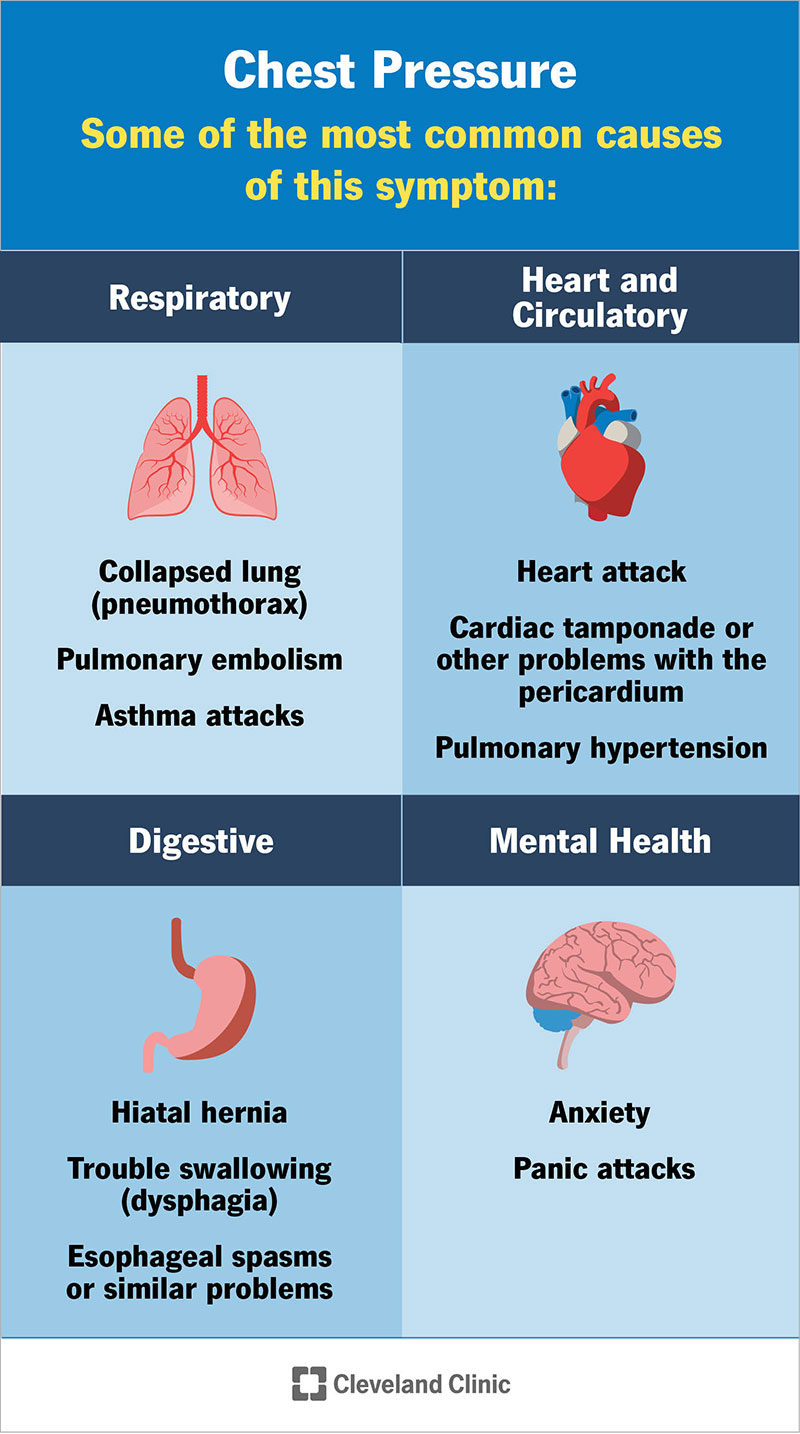Chest pressure is a symptom that happens with many medical conditions. Some, like heart attacks, are life-threatening. Others are treatable with home remedies or over-the-counter medications. It’s important not to self-diagnose this condition and to talk to a healthcare provider quickly to make sure it isn’t a sign of a dangerous problem.
Advertisement
Cleveland Clinic is a non-profit academic medical center. Advertising on our site helps support our mission. We do not endorse non-Cleveland Clinic products or services. Policy

Image content: This image is available to view online.
View image online (https://my.clevelandclinic.org/-/scassets/images/org/health/articles/22935-chest-pressure)
Chest pressure is a symptom that can signal dangerous, life-threatening problems like heart attacks. However, it can also happen with benign issues or conditions. Understanding this condition and its potential causes can help you spot warning signs of serious medical conditions and get help fast.
Advertisement
Cleveland Clinic is a non-profit academic medical center. Advertising on our site helps support our mission. We do not endorse non-Cleveland Clinic products or services. Policy
IMPORTANT: You should never assume that chest pressure can’t be a heart attack. If it could be a heart attack, even when the chances of it being one are slim, you should call 911 (or the relevant local emergency services phone number) immediately. Delaying medical care for a heart attack can lead to severe and permanent heart damage. While heart attacks tend to happen to people over the age of 50, they can happen to younger people for a wide range of reasons.
Chest pressure is a non-specific symptom, meaning it can happen for several different reasons. Potential causes include:
One of the key ways that healthcare providers determine what’s causing this symptom is by having you describe what it feels like and where the feeling is strongest. People with chest pressure often describe it using the following words:
Advertisement
Chest pain, pressure, or discomfort from a heart attack — or any other condition limiting blood flow to parts of your heart — is called angina. This kind of pressure or pain happens because without enough blood flow, the cells in the affected heart muscle will start to die.
Chest pressure from a heart attack often doesn’t stay in one place. It’s common for the pressure or pain to “radiate,” meaning it spreads outward toward other parts of your body like your neck, arm (especially left arm), jaw, abdomen (your belly), back or shoulder. It also tends to worsen when you're active and gets better when you rest, and it can also happen when you’re under severe emotional stress or during sexual activity.
Other key ways to distinguish causes of chest pressure include:
Answering or elaborating on the above questions and information is important when you talk to a healthcare provider. However, you should never try to self-diagnose chest pressure unless you've spoken with your healthcare provider about it before and they've given you guidance on what to watch for and how to react.
The treatment for chest pressure depends entirely on what causes it. Examples of possible treatments include:
You shouldn’t try to treat chest pressure at home without first talking to a healthcare provider. This is because chest pressure can be a sign of dangerous medical conditions that you shouldn’t self-diagnose. If chest pressure isn’t severe or happens gradually, you should call your healthcare provider to ask about it. This is because heart attacks can still cause chest pressure that isn’t severe. If it is severe or happens suddenly, you should get medical attention immediately.
Advertisement
Chest pressure is often unpredictable, so it isn't preventable. If it happens predictably or for preventable reasons, your healthcare provider is the best person to turn to for information. Once they find the cause, they can tell you more about how you can prevent chest pressure or limit its severity.
Chest pressure that happens suddenly or that is severe needs emergency medical attention. When it happens gradually or isn't severe, you should call your healthcare provider to ask them for guidance. In many cases, they'll advise you to get medical attention just to be sure you aren't having a more dangerous problem like a heart attack.
Chest pressure can be a sign of a dangerous problem, or it can happen for a harmless reason. Regardless of the cause, it's a symptom you shouldn't ignore or try to self-diagnose. If you experience chest pressure, you should call your healthcare provider and get their advice on what to do. If there's a chance it could be a heart attack or other life-threatening problem, you should act as if it is and get immediate medical attention right away. Delaying medical care for a medical emergency can lead to dangerous or deadly complications.
Advertisement

Sign up for our Health Essentials emails for expert guidance on nutrition, fitness, sleep, skin care and more.
Learn more about the Health Library and our editorial process.
Cleveland Clinic’s health articles are based on evidence-backed information and review by medical professionals to ensure accuracy, reliability and up-to-date clinical standards.
Cleveland Clinic’s health articles are based on evidence-backed information and review by medical professionals to ensure accuracy, reliability and up-to-date clinical standards.
Whether you need stitches, a broken bone set or think your appendix might be causing your abdominal pain, Cleveland Clinic’s emergency medicine team is here to help.
